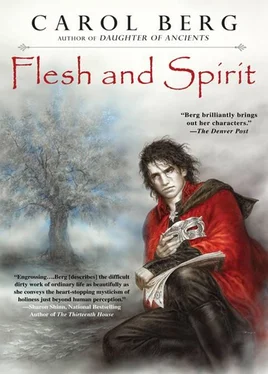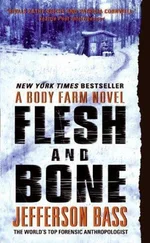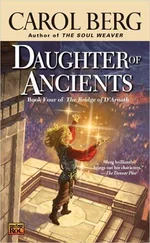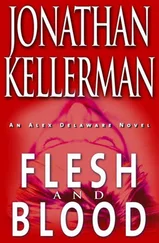I ought to have had some sympathy with the youngest of Eodward’s progeny or at least with his pureblood mother. Though not strictly a recondeur—she had not actually run away—Lirene de Armine-Visori had defied her family and the Registry’s breeding laws by mating outside the pureblood families, an unforgivable offense, no matter that her lover was a king. Lirene had died when the boy was quite young, and stories named the halfbreed Osriel, raised out of the public eye, twisted in both mind and body.
Veterans who had served in Prince Perryn’s ill-fated campaign to wrest Evanore’s gold mines from his bastard half brother displayed wicked burn scars from Osriel’s mage-fire arrows and told of comrades snatched in the night and returned without balls, tongues, or hands. They described plagues of nightmares that afflicted their encampments, and men and women found wandering the tangled forests naked and mindless, their privy parts blistered from forced breeding with gatzi—creatures from the netherworld, pledged to Magrog’s service. And they swore that on every battlefield near Evanore, what dead were left to lie through the night were missing their eyes on the next morning. Which seemed not such a dreadful thing in itself compared to being dead, save that most Navrons believed a man’s soul resided in his eyes. Without a soul, a man was left with no hope of an afterlife, for the Ferryman had naught to carry.
It’s a soldier’s wont to top the next man’s tale. For years, I took no more stock in the stories of Prince Osriel’s evils than in legends of angelic visitations or of the Danae whose dancing supposedly nurtured fields and forests. Gods knew battle left enough mutilated bodies for every demonic purpose. The pox from unclean whores was a scourge that could flay a man’s loins, and drinking raw spirits squeezed from agueroot could scour a mind to blankness for a week. Yet over the summer, as Prince Bayard’s march across Ardra drove us toward Evanore, one comrade and then another swore me to find him should he fall in battle, and to pierce his heart before nightfall to ensure he was well and truly dead before Osriel the Bastard came for him. Such stern belief cannot but wear upon a man’s mind and take on the likeness of truth.
When the lay brother Anselm had hurried off to bed and the choir monk Robierre to the church for another bout of praying, I prowled through the infirmary stores. Using scraps of twine and linen from Brother Robierre’s baskets, I wrapped up small amounts of his powders and herbs—anything he had in plenty that I might sell or need. I discovered an herb knife with a nicked blade shoved to the back of a shelf, and I took that, too, bundling it with the medicines in a rag and stuffing the bundle under my palliasse with the bits of cheese and bread I’d saved from every meal.
As I worked, a lesser puzzle nagged at me. Pureblood families flaunted their unbroken descent from the decadent Aurellians by speaking Aurellian and Navron interchangeably. It was a useless skill that only they and hidebound scholars set store by now Aurellia was reduced from a great empire to a walled city a thousand quellae distant. But such childhood training penetrates very deep. Even after twelve years away from pureblood society, I could not have said in which language I articulated my thoughts. Therefore, I could wonder at the Aurellian farewell that Brother Gildas had exchanged with the Evanori lord. Teneamus—we preserve.
The infirmary was dark, a single tall rushlight left burning. After returning from his prayers, the yawning infirmarian had retired gratefully to his own bed in the monks’ dorter, declaring me well enough to survive the night with only Iero’s angels to watch over me.
The weather had taken a turn for the worse. Sleet clicked on the roof and the stone path outside the open window, threatening to freeze and rot what scanty harvest might have ripened in the disastrously short, cold summer. A month or more remained till Saldon Night, and I ought to be basking in Ardra’s golden summer, pleasuring a milkmaid out of her chastity in a haystack instead of shivering in my bed.
Unnerved by the day’s events, I was infernally restless. When my breath became visible in the air, I dragged the blankets over my head, abandoning my toes to the cold draft left by the waning flames in the infirmary brazier. My wounds itched and throbbed, more annoying than sore. But deep in my gut sat a small tight knot, cold and quiet for the moment, the threads that linked it to every particle of my being slack.
A disease had gnawed at my gut since I was seven, probably longer if one assumed the rebellious temper and indiscipline that caused my parents to despair of me in the nursery were its first manifestations. Every day of my life I had lived with an unrelenting restlessness. On occasion it would worsen, exploding into a tormenting fire in the blood and a virulent overexcitement of the senses—everything I heard or smelled or looked on exaggerated until my body felt raw. By the time I was ten these attacks had become a regular occurrence, and as I got older, the symptoms grew worse and lasted for days at a time. Even soft candlelight would blind me, whispers set my nerves screaming, and any smell stronger than porridge leave me nauseated. The knot in my gut was ever the precursor of an attack.
I lay wide-eyed, sated with the days of sleep, wishing I had been able to convince Brother Robierre to give me poppy extract again. He hoarded it so carefully. Said their plants were not propagating well in the foul weather. That the abbey had any healthy plants at all was a wonder. Perhaps their god had powers enough to protect his holy place.
Matins came and went, allowing me to forget myself for a while in the beauteous surge of their singing—fifty-three strong male voices honoring their god. What deity could fail to manifest himself with such power at his beck? Yet in the ensuing silence, the warning in my belly grew more insistent, and hot, as if Brother Robierre had made another incision and implanted a burning coal inside me.
I slammed a fist into the thin pillow wadded under my head. This is far too early. It’s scarce been a fortnight. I buried my face in the pillow, unable to stop the calculation. We had abandoned the battle before its second day and spent two on the road, then I’d lain two days insensible in this infirmary, and four more recovering…and I’d last dealt with this a twelveday before the battle. Twenty-one days. Since I’d first chosen to control my disease with magic, I’d never felt its waking sooner than twenty-eight days. The problem, of course, was that the remedy had become its own disease, and I could no longer distinguish one from the other.
So think of something else. The wind whined in the cold and lonely blackness outside the infirmary walls. The blanket wool tickled my nose. Propped up on my elbow, I drained the last of the weak ale Brother Anselm had left me, and then threw the mug across the square red tiles. The clay vessel shattered. No rushes on the infirmary floor. No straw. Brother Anselm thought them unclean. I curled my arms over my head.
This is no battlefield with the stench of death all around. No whorehouse after the women have moved on to other customers. No stinking back street with rats and refuse your only company. Nor even is it that wretched house in Palinur where your existence was an offense to those who birthed you. You’re fed and warm and healing. You’ve friends here already. You don’t need this. Let the cursed sickness burn itself out.
But the coal took flame in my gut, its fiery wounding spreading rapidly into my chest and limbs, into my head, my eyes, my dry tongue. I shoved off the blankets and lay there naked and exposed, unbearably hot as I tried to breathe away the pain. The light seared my eyes. The rain drummed like thunder; the wind bellowed like maddened oxen.
Читать дальше












